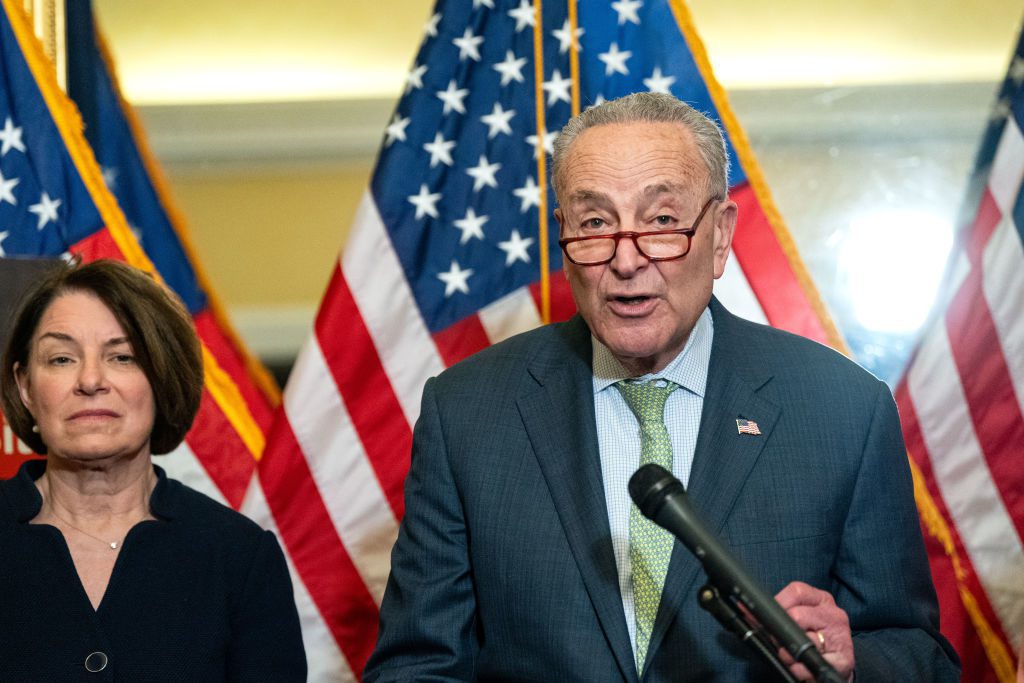
The Right to Contraception Act would protect access to birth control nationwide as many reproductive rights advocates worry that contraceptive access will be Republicans’ next target after they successfully helped overturn Roe v. Wade. (Photo by Kent Nishimura/Getty Images)
The Right to Contraception Act would protect access to birth control nationwide as many reproductive rights advocates worry that contraceptive access will be Republicans’ next target after they successfully helped overturn Roe v. Wade.
Senate Majority Leader Chuck Schumer (D-NY) announced on Wednesday that the Senate will vote on a bill regarding birth control access next month, a move partly intended to clarify Republicans’ stance on the hot-button issue ahead of November’s presidential election.
The bill, titled the Right to Contraception Act, would protect access to birth control nationwide. Many reproductive rights advocates worry that contraceptive access is next on the chopping block after Roe v. Wade, which once federally protected the right to an abortion, was overturned in 2022.
In remarks on the Senate floor Thursday, Schumer called the fall of Roe a “draconian” measure and said Senate Democrats would “never relent” on protecting reproductive rights.
“At a time when tens of millions of women are worried about reproductive health, although many male Americans are worried as well, Senate Democrats will focus on protecting fundamental freedoms like the right to choose, access to IVF, continued access to contraception, and more,” Schumer said.
This is not the first attempt by Democrats to enshrine protections for birth control into federal law. House Democrats passed the Right to Contraception Act in 2022, despite 195 House Republicans voting against it. But the bill was ultimately blocked by Republicans in the Senate.
Public support for birth control remains strong across party lines
The push to vote on contraception access comes as many Republican leaders have waffled on the issue. Birth control has long enjoyed bipartisan support, even among groups opposing abortion. In fact, 2022 polling from Independent Women’s Voice showed that nearly 83% of voters who self-identified as pro-life said they considered safe and legal birth control access to be “a pro-life position.”
Further polling shows that birth control is nearly universally used, even among women who identify as religious. The Guttmacher Institute reported that more than 99% of sexually active American women between the ages of 15-44 had used at least one form of contraception by 2008.
And just this year, polling from Impact Research showed vast bipartisan support among American voters for the Right to Contraception Act itself, with 94% of Democrats and 68% of Republicans saying they favored the bill.
Beyond pregnancy prevention, contraceptive measures have many health uses, which contributes to their widespread use. Contraceptives like the birth control pill have long been used to treat painful menstrual cramps, hormone-induced migraines, acne, painful menstrual cramping, endometriosis, and certain conditions like polycystic ovarian syndrome. There’s even evidence to suggest that use of oral contraceptives can reduce risk for certain types of cancer.
Despite this, Republican leaders have seemingly catered to more extreme far-right and religious groups on the topic of contraception in the post-Roe landscape.
Schumer and other Democrats hope a fast-tracked vote on the issue will force Senate Republicans to openly acknowledge their intent to strike down birth control access and inform voters as to what’s at stake in the case of a second Trump presidency or a Republican-controlled House.
“The American people have a right to know where their elected officials stand on protecting the rights and reproductive care,” Schumer said.
Trump suggests support for restricted birth control, pregnancy tracking
Democrats’ effort also comes as the issue of birth control has become a key campaign issue in in this year’s presidential election.
This week, Trump told Pittsburgh CBS affiliate KDKA that he was “looking at” the possibility of restricting birth control access and suggested he would support a state-by-state approach to enforcing such restrictions.
“You know, things really have a lot to do with the states, and some states are going to have different policy than others,” Trump told news anchor Jon Delano on Tuesday. “But I am coming out, within a week or so, with a very comprehensive policy, which I’ll get to you immediately.”
Later that day, Trump took to social media platform Truth Social to walk back his comments, writing, “I HAVE NEVER, AND WILL NEVER ADVOCATE IMPOSING RESTRICTIONS ON BIRTH CONTROL, or other contraceptives.”
Trump’s comments came in the wake of an interview with Time Magazine that troubled many reproductive rights advocates. In the interview, published earlier this month, Trump again pointed to states’ rights when asked if he’d allow state officials to monitor pregnancies or pursue criminal charges in states where abortion is heavily regulated.
Anti-choice groups seek support from evangelicals, pro-life Republicans
While Trump has yet to release a concrete statement about how he would handle reproductive health care during a second term, other Trump-backing Republican leaders and far-right groups like the Heritage Foundation have used momentum from the fall of Roe to push for further limits on birth control, in-vitro fertilization (IVF), and even surrogacy.
As of 2024, 13 states have introduced so-called “fetal personhood” legislation, which defines life as beginning at the very instant of conception and offers fertilized embryos the same rights afforded to people. Such legislation could criminalize the pursuit of fertility treatments like IVF, in which healthy embryos are identified and implanted into the uterus, while non-viable embryos are often discarded.
In February, Alabama’s Supreme Court even issued a ruling proclaiming that embryos had the same rights as living children, though additional legislation was later passed to protect IVF clinics and patients in Alabama from criminal prosecution.
But reproductive rights activists remain fearful about the influence of plans like Project 2025, a controversial blueprint from the Heritage Foundation meant to outline policy priorities for a second Trump term. Heritage has been clear about its stance against fertility treatments like IVF, even comparing IVF to “eugenics.”
Staunchly anti-choice groups like Heritage and Susan B. Anthony Pro-Life America have also repeatedly tapped into evangelical Christian leaders and pro-life Republicans for support, seemingly hoping to leverage these groups to vote against birth control access and fertility treatments in the same way they did during the decades-long crusade against Roe.
In a January blog post from Heritage, Senior Research Associate Emma Waters wrote, “The assault on what it means to be human, from sexuality to artificial creations of human life, requires Christians to stand firm in their support for the integrity of marriage, sex, and procreation.”
She continued, “Moral ambiguity will only breed more hardship in the life of the Church. Protestant denominations and leaders must carve a courageous vision forward about the good news of biblical anthropology.”
Biden reinforces support for birth control access and reproductive rights
Meanwhile, the Biden-Harris administration has doubled down on support for IVF, birth control, and other forms of reproductive health care.
In response to Trump’s comments to KDKA regarding birth control, Biden spokesperson Sarafina Chitika released a statement accusing Trump of wanting to “rip away” access to contraception.
“Women across the country are already suffering from Donald Trump’s post-Roe nightmare, and if he wins a second term, it’s clear he wants to go even further by restricting access to birth control and emergency contraceptives,” she said.
Biden has issued executive orders to strengthen access to family planning services and increase the availability of over-the-counter birth control options. His administration has also vowed to protect access to medication abortion, safeguard patient privacy related to reproductive health, and, more broadly, to restore the federal right to abortion once afforded by Roe v. Wade—a move that will likely only be possible if Biden is reelected and Democrats gain a majority in the House while retaining control of the Senate.
“The disregard for women’s ability to make these decisions for themselves and their families is outrageous and unacceptable,” Biden said in a statement following Alabama’s January IVF ruling. “We’re fighting for the freedom of women, for families, and for doctors who care for these women. And we won’t stop until we restore the protections of Roe v. Wade in federal law for all women in every state.”

More Iowans leave state for abortion care as demand for help surges
Since Iowa’s near-total abortion ban went into effect in July 2024, the number of residents seeking abortion care outside the state has surged...

House GOP fast-tracks budget bill that would cut off Medicaid funding to Planned Parenthood
The budget package proposes steep health care cuts—and includes a new push to block patients from accessing reproductive care. In a 30-24 party-line...

Report: Majority of pregnancy-related deaths in Iowa could have been prevented
A newly released report found that 95% of pregnancy-related deaths in Iowa were preventable, and those deaths disproportionately affected women who...

Shattering stigma: Iowa woman shares her abortion story to empower others
There are different types of people who seek abortions. Here is the story of one of those women—the everyday woman who accidentally got pregnant....

New Iowa bill would ban abortion pill, sparking backlash
Republican proposes bill to effectively end 74% of abortions in Iowa by banning a pill that’s safer than penicillin and Viagra. Seventy-four...

Way more Americans are getting sterilized since Roe was struck down, research finds
A new study has found that from May to August 2022, vasectomies surged by 95% and tubal sterilizations increased by 70% among adults ages 19 to 26....





